Welcome to the home of
Around Town News
plus: Waldport Tech Services & Phil - The Computer Guy

Serving Yachats, Waldport, Seal Rock & Newport -- Oregon
Where Fun & Business Go Together
Office: 541 563-5409
(Mon-Sat, 10am - 6pm)
Serving Since 2018
Archives / Previous Editions
Click on the Edition you would like to View
(and click on the issue # / date again to close it)
Volume #8 -- (Mar 2025 - present)
✒ Issue #12, 30 May 2025
✒ Issue #11, 23 May 2025
✒ Issue #10, 16 May 2025
✒ Issue #09, 09 May 2025
✒ Issue #08, 02 May 2025
✒ Issue #07, 25 Apr 2025
✒ Issue #05, 11 Apr 2025
✒ Issue #02, 21 Mar 2025
✒ Issue #01, 14 Mar 2025
Volume #7 -- (Mar 2024 - 2025)
✒ Issue #49, 14 Feb 2025
✒ Issue #48, 07 Feb 2025
✒ Issue #47, 31 Jan 2025
✒ Issue #46, 24 Jan 2025
✒ Issue #45, 17 Jan 2025
✒ Issue #44, 10 Jan 2025
✒ Issue #43, 03 Jan 2025
✒ Issue #42, 27 Dec 2024
✒ Issue #41, 20 Dec 2024
✒ Issue #40, 13 Dec 2024
✒ Issue #39, 06 Dec 2024
✒ Issue #38, 29 Nov 2024
✒ Issue #36, 15 Nov 2024
✒ Issue #34, 01 Nov 2024
✒ Issue #33, 25 Oct 2024
✒ Issue #32, 18 Oct 2024
✒ Issue #31, 11 Oct 2024
✒ Issue #30, 04 Oct 2024
✒ Issue #29, 27 Sep 2024
✒ Issue #27, 13 Sep 2024
✒ Issue #26, 06 Sep 2024
✒ Issue #25, 30 Aug 2024
✒ Issue #24, 23 Aug 2024
✒ Issue #23, 16 Aug 2024
✒ Issue #22, 09 Aug 2024
✒ Issue #21, 02 Aug 2024
✒ Issue #20, 26 Jul 2024
✒ Issue #19, 19 Jul 2024
✒ Issue #18, 12 Jul 2024
✒ Issue #17, 05 Jul 2024
✒ Issue #16, 28 Jun 2024
✒ Issue #15, 21 Jun 2024
✒ Issue #14, 14 Jun 2024
✒ Issue #13, 07 Jun 2024
✒ Issue #12, 31 May 2024
✒ Issue #11, 24 May 2024
✒ Issue #10, 17 May 2024
✒ Issue #09, 10 May 2024
✒ Issue #08, 03 May 2024
✒ Issue #07, 26 Apr 2024
✒ Issue #06, 19 Apr 2024
✒ Issue #05, 12 Apr 2024
✒ Issue #04, 05 Apr 2024
✒ Issue #03, 29 Mar 2024
✒ Issue #02, 22 Mar 2024
✒ Issue #01, 15 Mar 2024
Volume #6 -- (Mar 2023 - 2024)
✒ Issue #52, 08 Mar 2024
✒ Issue #51, 01 Mar 2024
✒ Issue #50, 23 Feb 2024
✒ Issue #49, 16 Feb 2024
✒ Issue #48, 09 Feb 2024
✒ Issue #47, 02 Feb 2024
✒ Issue #46, 26 Jan 2024
✒ Issue #45, 19 Jan 2024
✒ Issue #44, 12 Jan 2024
✒ Issue #42, 29 Dec 2023
✒ Issue #41, 22 Dec 2023
✒ Issue #40, 15 Dec 2023
✒ Issue #39, 08 Dec 2023
✒ Issue #38, 01 Dec 2023
✒ Issue #36, 17 Nov 2023
✒ Issue #35, 10 Nov 2023
✒ Issue #34, 03 Nov 2023
✒ Issue #33, 27 Oct 2023
✒ Issue #31, 13 Oct 2023
✒ Issue #30, 06 Oct 2023
✒ Issue #29, 29 Sep 2023
✒ Issue #28, 22 Sep 2023
✒ Issue #27, 15 Sep 2023
✒ Issue #26, 08 Sep 2023
✒ Issue #25, 01 Sep 2023
✒ Issue #24, 24 Aug 2023
✒ Issue #23, 18 Aug 2023
✒ Issue #22, 11 Aug 2023
✒ Issue #20, 28 Jul 2023
✒ Issue #18, 14 Jul 2023
✒ Issue #17, 07 Jul 2023
✒ Issue #16, 30 Jun 2023
✒ Issue #15, 23 Jun 2023
✒ Issue #14, 16 Jun 2023
✒ Issue #13, 09 Jun 2023
✒ Issue #12, 02 Jun 2023
✒ Issue #11, 26 May 2023
✒ Issue #10, 19 May 2023
✒ Issue #09, 12 May 2023
✒ Issue #08, 05 May 2023
✒ Issue #07, 28 Apr 2023
✒ Issue #06, 21 Apr 2023
✒ Issue #05, 14 Apr 2023
✒ Issue #04, 07 Apr 2023
✒ Issue #03, 31 Mar 2023
✒ Issue #02, 24 Mar 2023
✒ Issue #01, 17 Mar 2023
Volume #5 -- (Mar 2022 - 2023)
✒ Issue #52, 10 Mar 2023
✒ Issue #51, 03 Mar 2023
✒ Issue #50, 24 Feb 2023
✒ Issue #49, 17 Feb 2023
✒ Issue #48, 10 Feb 2023
✒ Issue #47, 03 Feb 2023
✒ Issue #46, 27 Jan 2023
✒ Issue #45, 20 Jan 2023
✒ Issue #44, 13 Jan 2023
✒ Issue #43, 06 Jan 2023
✒ Issue #42, 30 Dec 2022
✒ Issue #41, 23 Dec 2022
✒ Issue #40, 16 Dec 2022
✒ Issue #39, 09 Dec 2022
✒ Issue #38, 02 Dec 2022
✒ Issue #37, 25 Nov 2022
✒ Issue #36, 18 Nov 2022
✒ Issue #35, 11 Nov 2022
✒ Issue #34, 04 Nov 2022
✒ Issue #33, 28 Oct 2022
✒ Issue #32, 21 Oct 2022
✒ Issue #31, 14 Oct 2022
✒ Issue #30, 07 Oct 2022
✒ Issue #29, 30 Sep 2022
✒ Issue #28, 23 Sep 2022
✒ Issue #27, 16 Sep 2022
✒ Issue #26, 09 Sep 2022
✒ Issue #25, 02 Sep 2022
✒ Issue #24, 26 Aug 2022
✒ Issue #23, 19 Aug 2022
✒ Issue #22, 12 Aug 2022
✒ Issue #21, 05 Aug 2022
✒ Issue #20, 29 Jul 2022
✒ Issue #19, 22 Jul 2022
✒ Issue #18, 15 Jul 2022
✒ Issue #17, 08 Jul 2022
✒ Issue #16, 01 Jul 2022
✒ Issue #15, 24 Jun 2022
✒ Issue #14, 17 Jun 2022
✒ Issue #13, 10 Jun 2022
✒ Issue #12, 03 Jun 2022
✒ Issue #11, 27 May 2022
✒ Issue #10, 20 May 2022
✒ Issue #09, 13 May 2022
✒ Issue #08, 06 May 2022
✒ Issue #07, 29 Apr 2022
✒ Issue #06, 22 Apr 2022
✒ Issue #05, 15 Apr 2022
✒ Issue #04, 08 Apr 2022
✒ Issue #03, 01 Apr 2022
✒ Issue #02, 25 Mar 2022
✒ Issue #01, 18 Mar 2022
Volume #4 -- (Mar 2021 - 2022)
✒ Issue #52, 11 Mar 2022
✒ Issue #51, 04 Mar 2022
✒ Issue #50, 25 Feb 2022
✒ Issue #49, 18 Feb 2022
✒ Issue #48, 11 Feb 2022
✒ Issue #47, 04 Feb 2022
✒ Issue #46, 28 Jan 2022
✒ Issue #45, 21 Jan 2022
✒ Issue #44, 14 Jan 2022
✒ Issue #43, 07 Jan 2022
✒ Issue #42, 31 Dec 2021
✒ Issue #41, 24 Dec 2021
✒ Issue #40, 17 Dec 2021
✒ Issue #39, 10 Dec 2021
✒ Issue #38, 03 Dec 2021
✒ Issue #37, 26 Nov 2021
✒ Issue #36, 19 Nov 2021
✒ Issue #35, 12 Nov 2021
✒ Issue #34, 05 Nov 2021
✒ Issue #33, 29 Oct 2021
✒ Issue #32, 22 Oct 2021
✒ Issue #31, 15 Oct 2021
✒ Issue #30, 08 Oct 2021
✒ Issue #29, 01 Oct 2021
✒ Issue #28, 24 Sep 2021
✒ Issue #27, 17 Sep 2021
✒ Issue #26, 13 Sep 2021
✒ Issue #25, 30 Aug 2021
✒ Issue #24, 30 Aug 2021
✒ Issue #23, 23 Aug 2021
✒ Issue #22, 16 Aug 2021
✒ Issue #21, 09 Aug 2021
✒ Issue #20, 02 Aug 2021
✒ Issue #19, 26 Jul 2021
✒ Issue #18, 19 Jul 2021
✒ Issue #17, 12 Jul 2021
✒ Issue #16, 05 Jul 2021
✒ Issue #15, 28 Jun 2021
✒ Issue #14, 21 Jun 2021
✒ Issue #13, 14 Jun 2021
✒ Issue #12, 07 Jun 2021
✒ Issue #11, 31 May 2021
✒ Issue #10, 24 May 2021
✒ Issue #09, 17 May 2021
✒ Issue #08, 10 May 2021
✒ Issue #07, 03 May 2021
✒ Issue #06, 26 Apr 2021
✒ Issue #05, 19 Apr 2021
✒ Issue #04, 12 Apr 2021
✒ Issue #03, 05 Apr 2021
✒ Issue #02, 29 Mar 2021
✒ Issue #01, 22 Mar 2021
Volume #3 -- (Mar 2020 - 2021)
✒ Issue #52, 15 Mar 2021
✒ Issue #51, 08 Mar 2021
✒ Issue #50, 01 Mar 2021
✒ Issue #49, 22 Feb 2021
✒ Issue #48, 15 Feb 2021
✒ Issue #47, 08 Feb 2021
✒ Issue #46, 01 Feb 2021
✒ Issue #45, 25 Jan 2021
✒ Issue #44, 18 Jan 2021
✒ Issue #43, 11 Jan 2021
✒ Issue #42, 04 Jan 2021
✒ Issue #41, 28 Dec 2020
✒ Issue #40, 21 Dec 2020
✒ Issue #39, 14 Dec 2020
✒ Issue #38, 07 Dec 2020
✒ Issue #37, 30 Nov 2020
✒ Issue #36, 23 Nov 2020
✒ Issue #35, 16 Nov 2020
✒ Issue #34, 09 Nov 2020
✒ Issue #33, 05 Nov 2020
✒ Issue #32, 26 Oct 2020
✒ Issue #31, 19 Oct 2020
✒ Issue #30, 12 Oct 2020
✒ Issue #29, 05 Oct 2020
✒ Issue #28, 27 Sep 2020
✒ Issue #27, 21 Sep 2020
✒ Issue #26, 14 Sep 2020
✒ Issue #25, 07 Sep 2020
✒ Issue #24, 31 Aug 2020
✒ Issue #23, 25 Aug 2020
✒ Issue #22, 17 Aug 2020
✒ Issue #21, 10 Aug 2020
✒ Issue #20, 03 Aug 2020
✒ Issue #19, 27 Jul 2020
✒ Issue #18, 20 Jul 2020
✒ Issue #17, 13 Jul 2020
✒ Issue #16, 06 Jul 2020
✒ Issue #15, 29 Jun 2020
✒ Issue #14, 22 Jun 2020
✒ Issue #13, 15 Jun 2020
✒ Issue #12, 08 Jun 2020
✒ Issue #11, 01 Jun 2020
✒ Issue #10, 25 May 2020
✒ Issue #09, 18 May 2020
✒ Issue #08, 11 May 2020
✒ Issue #07, 04 May 2020
✒ Issue #06, 27 Apr 2020
✒ Issue #05, 20 Apr 2020
✒ Issue #04, 13 Apr 2020
✒ Issue #03, 06 Apr 2020
✒ Issue #02, 30 Mar 2020
✒ Issue #01, 23 Mar 2020
Volume #2 -- (Mar 2019 - 2020)
✒ Issue #52, 16 Mar 2020
✒ Issue #51, 09 Mar 2020
✒ Issue #50, 02 Mar 2020
✒ Issue #49, 24 Feb 2020
✒ Issue #48, 17 Feb 2020
✒ Issue #47, 10 Feb 2020
✒ Issue #46, 03 Feb 2020
✒ Issue #45, 27 Jan 2020
✒ Issue #44, 20 Jan 2020
✒ Issue #43, 06 Jan 2020
✒ Issue #42, 06 Jan 2020
✒ Issue #41, 30 Dec 2019
✒ Issue #40, 23 Dec 2019
✒ Issue #39, 16 Dec 2019
✒ Issue #38, 09 Dec 2019
✒ Issue #37, 02 Dec 2019
✒ Issue #36, 25 Nov 2019
✒ Issue #35, 18 Nov 2019
✒ Issue #34, 11 Nov 2019
✒ Issue #33, 04 Nov 2019
✒ Issue #32, 28 Oct 2019
✒ Issue #31, 21 Oct 2019
✒ Issue #30, 14 Oct 2019
✒ Issue #29, 07 Oct 2019
✒ Issue #28, 30 Sep 2019
✒ Issue #27, 23 Sep 2019
✒ Issue #26, 16 Sep 2019
✒ Issue #25, 09 Sep 2019
✒ Issue #24, 02 Sep 2019
✒ Issue #23, 26 Aug 2019
✒ Issue #22, 19 Aug 2019
✒ Issue #21, 12 Aug 2019
✒ Issue #20, 05 Aug 2019
✒ Issue #19, 22 Jul 2019
✒ Issue #18, 22 Jul 2019
✒ Issue #17, 15 Jul 2019
✒ Issue #16, 08 Jul 2019
✒ Issue #15, 01 Jul 2019
✒ Issue #14, 24 Jun 2019
✒ Issue #13, 17 Jun 2019
✒ Issue #12, 10 Jun 2019
✒ Issue #11, 03 Jun 2019
✒ Issue #10, 27 May 2019
✒ Issue #09, 20 May 2019
✒ Issue #08, 13 May 2019
✒ Issue #07, 06 May 2019
✒ Issue #06, 29 Apr 2019
✒ Issue #05, 22 Apr 2019
✒ Issue #04, 15 Apr 2019
✒ Issue #03, 08 Apr 2019
✒ Issue #02, 01 Apr 2019
✒ Issue #01, 25 Mar 2019
Volume #1 -- (Mar 2018 - 2019)
✒ Issue #52, 18 Mar 2019
✒ Issue #51, 11 Mar 2019
✒ Issue #50, 04 Mar 2019
✒ Issue #49, 25 Feb 2019
✒ Issue #48, 18 Feb 2019
✒ Issue #47, 11 Feb 2019
✒ Issue #46, 04 Feb 2019
✒ Issue #45, 28 Jan 2019
✒ Issue #44, 21 Jan 2019
✒ Issue #43, 14 Jan 2019
✒ Issue #42, 07 Jan 2019
✒ Issue #41, 31 Dec 2018
✒ Issue #40, 24 Dec 2018
✒ Issue #39, 17 Dec 2018
✒ Issue #38, 10 Dec 2018
✒ Issue #37, 03 Dec 2018
✒ Issue #36, 26 Nov 2018
✒ Issue #35, 19 Nov 2018
✒ Issue #34, 12 Nov 2018
✒ Issue #33, 05 Nov 2018
✒ Issue #32, 29 Oct 2018
✒ Issue #31, 22 Oct 2018
✒ Issue #30, 15 Oct 2018
✒ Issue #29, 08 Oct 2018
✒ Issue #28, 01 Oct 2018
✒ Issue #27, 24 Sep 2018
✒ Issue #26, 17 Sep 2018
✒ Issue #25, 10 Sep 2018
✒ Issue #24, 03 Sep 2018
✒ Issue #23, 27 Aug 2018
✒ Issue #22, 20 Aug 2018
✒ Issue #21, 13 Aug 2018
✒ Issue #20, 06 Aug 2018
✒ Issue #19, 30 Jul 2018
✒ Issue #18, 23 Jul 2018
✒ Issue #17, 16 Jul 2018
✒ Issue #16, 09 Jul 2018
✒ Issue #15, 02 Jul 2018
✒ Issue #14, 25 Jun 2018
✒ Issue #13, 18 Jun 2018
✒ Issue #12, 11 Jun 2018
✒ Issue #11, 04 Jun 2018
✒ Issue #10, 28 May 2018
✒ Issue #09, 21 May 2018
✒ Issue #08, 14 May 2018
✒ Issue #07, 07 May 2018
✒ Issue #06, 30 Apr 2018
✒ Issue #05, 23 Apr 2018
✒ Issue #04, 16 Apr 2018
✒ Issue #03, 09 Apr 2018
✒ Issue #02, 02 Apr 2018
✒ Issue #01, 26 Mar 2018
If you're looking for something older, then you are probably thinking of the Pacific Skinny.
|
They are out of business, and it now appears that their website is no longer available.
You can give it a shot, though, by clicking here: www.pacificskinny.com
We applaud the Pacific Skinny for over 20 yrs of service to south
Lincoln County and we know we can never replace them, only try to succeed them |
NOTE: Coupons downloaded and printed from any of these back issues are are almost
certainly expired and invalid. Even in the current issue, printing a coupon out at home
may or may not be valid. Check each coupon for possible exclusions, and know that if the
the issue itself is "expired" (not the current one), then the coupon is also (almost certainly)
expired.
A Peanut Version of the History of Data Storage (among Earth-descended Humans)
Archives used to be...

A small portion of the cave paintings of Lascaux, France. Dazzling.
About 20,000 years old, and show great sophistication, so people had already
been doing these for quite some time. No one really knows how long. At least,
no one we know.
There are other sites fabulously older, perhaps 35,000 years or more, though the work is a little more primitive than at Lascaux.
Regardless, that's long term data storage...
(Your CDs, DVDs and audio / video tapes are all good about 10 - 15 years. Whoopie!)
There are other sites fabulously older, perhaps 35,000 years or more, though the work is a little more primitive than at Lascaux.
Regardless, that's long term data storage...
(Your CDs, DVDs and audio / video tapes are all good about 10 - 15 years. Whoopie!)
And of course, before, during and after there was the Oral Tradition
(you know, Story Telling!) which was definitely a form of data storage.
Ah, but was it accurate, you ask?
A very good question. Glad you asked. Next question, please?

We can say that it is still very much in use today. More so than you realize!
Then maybe 13,000 years after the Cave Paintings of Lascaux

You know the expression "it's not written in stone?"
That must be a relatively recent thing, don't you think?
That must be a relatively recent thing, don't you think?
And about 5,000 years after that...


and another 2,000 years or so...


Actually a clip from the 1986 movie The Name of the Rose.
Sean Connery and Christian Slater. Fairly accurate portrayal of books,
how books were made and European monastic life around the 14th century,
all wrapped up in an unlikely (but very entertaining) murder mystery.
Every book crafted then was a unique work of art,
painstakingly drawn by hand
 For centuries, after the fall of Rome and the destruction of most of the great libraries
all across those lands, the Monks and copyists were the one sanctuary for what little
knowledge remained in Europe. The Renaisance was, in part, caused by merchants bringing
back old books lost and quite a few new ones that were discovered on their travels.
For centuries, after the fall of Rome and the destruction of most of the great libraries
all across those lands, the Monks and copyists were the one sanctuary for what little
knowledge remained in Europe. The Renaisance was, in part, caused by merchants bringing
back old books lost and quite a few new ones that were discovered on their travels.

It was called (in fact) Hand Illumination
But that also meant almost no one had access to any book ever;
they were rare, expensive, and almost too valuable to actually read.
Even most Catholic priests
had never even seen a Bible, for instance, let alone read one.
They simply were not available. Books were for the extremely elite,
not for the masses, not even in the Church. Which puts us back into the Oral
Tradition methods of data storage -- older priests reciting to younger ones.
See above: 20,000 years earlier!
Then in the 15th Century (1440, actually), Gutenberg happened
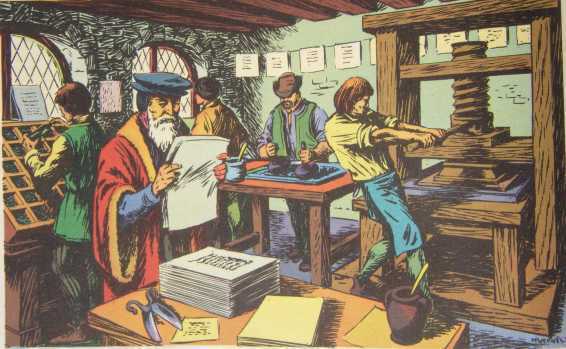

This modern gadget will completly print, bind and trim a library quality book,
all in one go. Even Gutenberg would be impressed.
And suddenly books were cheap(-er) and easy(-ish) to produce.
What happened all over Europe then is extremely similar to what happened between say, 1975 and 1995. "Big Iron," (mainframe computers) expensive, cranky, hard to use, was suddenly the small computer and was available to everybody (though still cranky).
Very similar to the Printed Book, with similar social changes.
What happened all over Europe then is extremely similar to what happened between say, 1975 and 1995. "Big Iron," (mainframe computers) expensive, cranky, hard to use, was suddenly the small computer and was available to everybody (though still cranky).
Very similar to the Printed Book, with similar social changes.
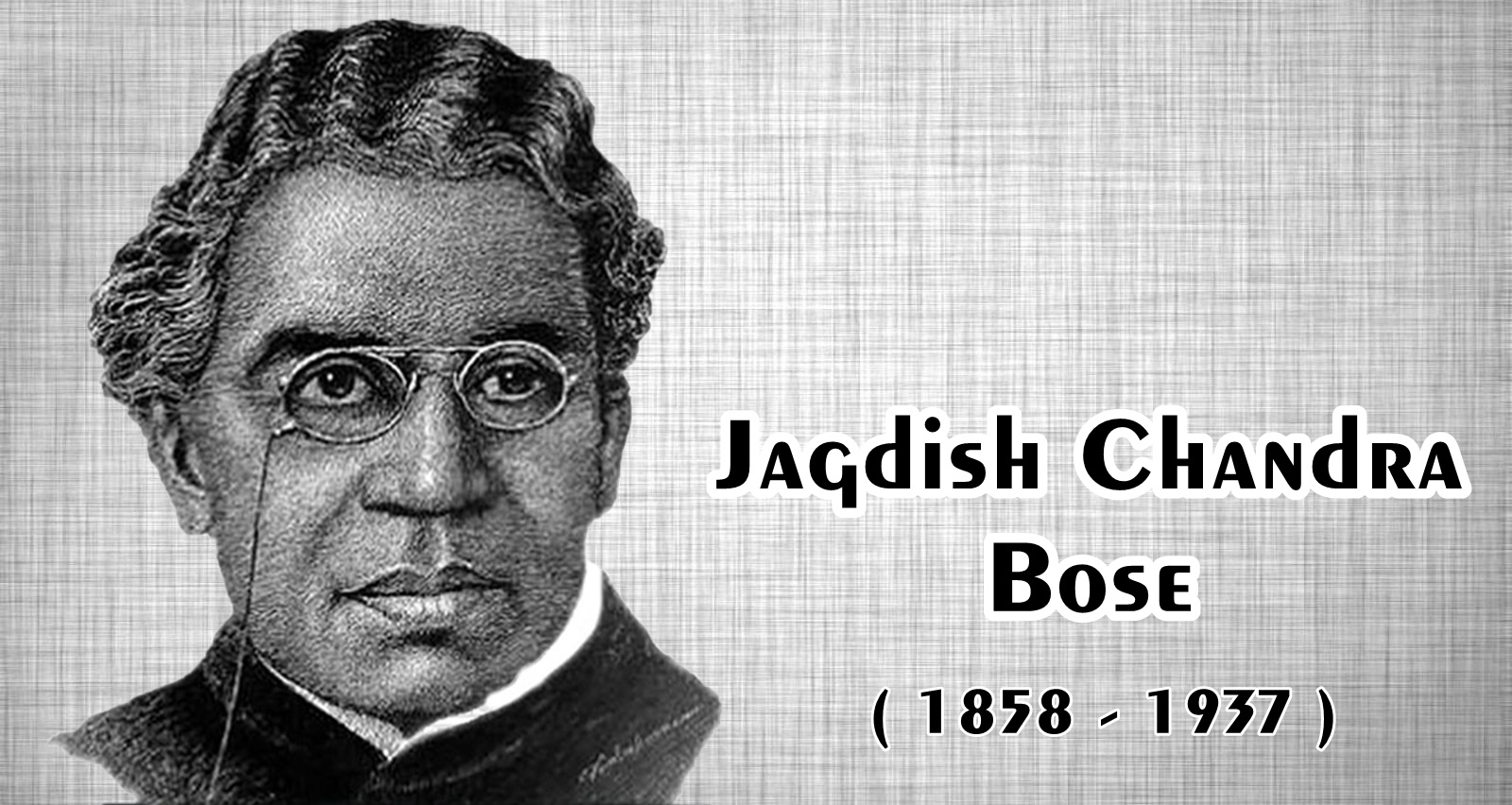
Jagdish Chandra Bose was, in a way, India's version of Nicola Tesla, and besides discovering radio years and years before Marconi, he also is credited with startling insights and observations into the life cycles of plants and dynamics of plant sentience, and a host of other things little understood since he stopped being available to explain them to us.
Of course, the Chinese had had a form of printing press for centuries already at this time.
But Western History refuses to acknowledge that, so we won't mention it either.
 Although... there's been some speculation that Gutenberg got the idea from Asia, one way or another. There
was a lot of commerce and a lot of merchants who went back and forth, so it's possible.
Although... there's been some speculation that Gutenberg got the idea from Asia, one way or another. There
was a lot of commerce and a lot of merchants who went back and forth, so it's possible.
Just as Marconi did not first invent/discover radio (that was Jagadish Chandra Bose, some years earlier), maybe Gutenberg only introduced the press to Europe. Who can say?

Just as Marconi did not first invent/discover radio (that was Jagadish Chandra Bose, some years earlier), maybe Gutenberg only introduced the press to Europe. Who can say?
And then several centuries went by...
(Mulitple pictures here... just be patient.)

Oops: Then Modern Technology happened...
And change gets very compressed from here on
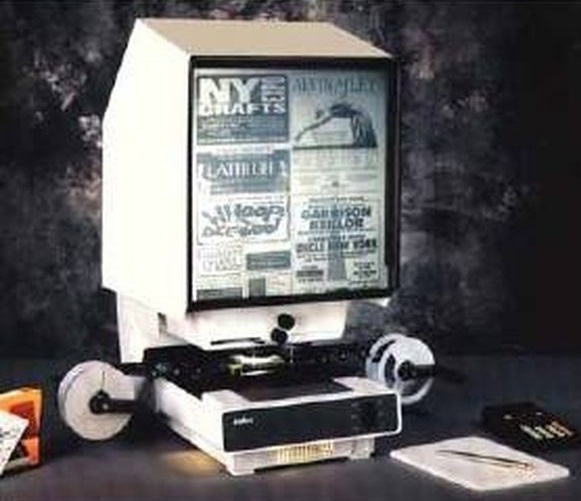
Microfiche, a film-strip reader, basically.
Awful to use! Excedrin Headache #147 -- or there-abouts
(Oh, and notice the little calculator to the right of the projector?
That, back then, probably cost the same as a full laptop computer does
today, or even more (much more!), when adjusted for inflation.)
You can credit Isaac Asimov (in his book Foundation, 1951) for first concept of the hand-held calculator. Just as Robert Heinlein first invented the cell phone (and the water bed, microwave oven and lot's more), in his book Space Cadet, 1948.
SciFi: doing what it's supposed to do.
You can credit Isaac Asimov (in his book Foundation, 1951) for first concept of the hand-held calculator. Just as Robert Heinlein first invented the cell phone (and the water bed, microwave oven and lot's more), in his book Space Cadet, 1948.
SciFi: doing what it's supposed to do.

Do Not Fold Spindle or Mutilate, an emmy-nominated 1971 TV movie, with Helen Hayes,
involving the use of a computer dating service. (Yeah, computer dating is not new.)
And sort of at the same time we had the
"do not fold, spindle or mutilate" era
"do not fold, spindle or mutilate" era
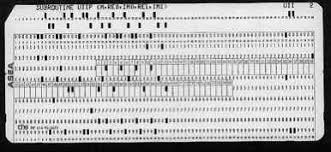
You could actually get your water bill in the mail printed out (sort of) on one of these things,
which you were supposed to send back along with your check. The payment would then
be processed by sending this "punch card" through to the computer with some datum
saying you paid it. That was "automation" back then. No, really! It was!! Honest...
Then what Never Did Happen -- the Super Super Super Computer,
repository of "all human knowledge," able to think faster than Elon Musk
repository of "all human knowledge," able to think faster than Elon Musk
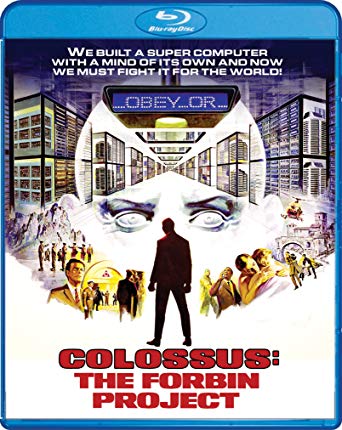

From Colossus: the Forbin Project, Universal Pictures, 1970
Colossus filled a mountain and was nuclear powered. Bad idea, as it turned out. No off switch!
Fortunately, all computers since then have had a power plug that can be pulled out.
 Actually the first "personal computer" is now acknowledged as the
Kenbak-1, 1971.
Actually the first "personal computer" is now acknowledged as the
Kenbak-1, 1971.
Produced in the days before microprocessors, it was intended as an educational tool for young computer scientists. (Not really "scientists" in the proper meaning of the word; extremely high-level engineers more like -- but that's harder to say than "scientist." Today it's neither, just another trade, like plumbing.)
All the details you could want are here kenbak-1.net/ and here kenbakkit.com.
But... no data storage; that is the whole thing, shown above. So it really doesn't apply to us here.
BTW: it sold for $750USD in 1971, which is about $4,600 in 2018 money.
But That Never Happened because the Small Small Small Computer was suddenly everywhere
(which is a whole 'nother story, of course)
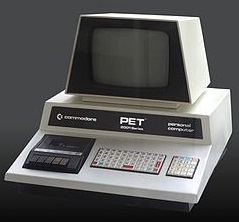
Until this point, only Governments, Major Corporations and
the occasional University, or the Super Crime Lord being
chased by James Bond or the IM Forces, could afford a computer. And each
one needed a large team to use it and keep it healthy.
Even the Crime Lord's computer had to have a large staff of Diabolical Scientists to run it. Ordinary scientists would never do, of course, but then ordinary uses of computers never required a Scientist just to run it, so it must have been a Super Crime Lord thing...
So now all businesses, public schools and even small-time criminals could have a computer. But...
Even the Crime Lord's computer had to have a large staff of Diabolical Scientists to run it. Ordinary scientists would never do, of course, but then ordinary uses of computers never required a Scientist just to run it, so it must have been a Super Crime Lord thing...
So now all businesses, public schools and even small-time criminals could have a computer. But...
Those small computers used Cassette Tapes for data storage
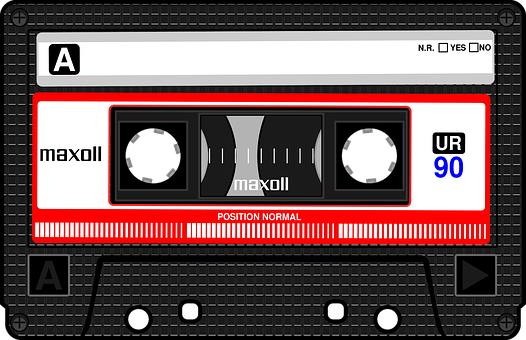
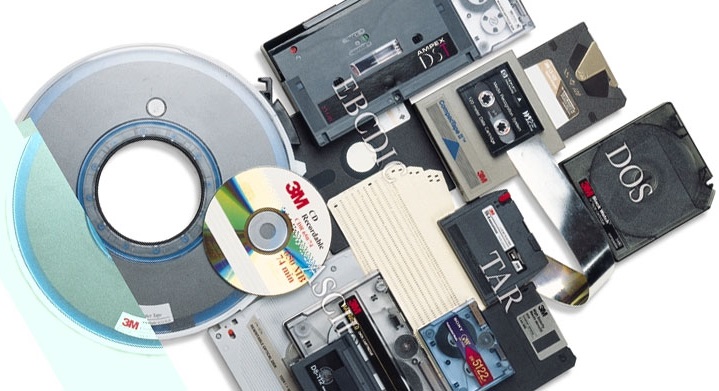
Actually, "magnetic media" came (and still comes) in a variety of formats and for a wide
variety of uses. The cassette tape was handy to sell to the consumer, partly
because it was familiar and partly because it was already on all the store shelves.
That did not make it the right choice.
That did not make it the right choice.
What's All the Gabble Mean?
| 1 byte | one bit of data, a letter, say |
| 1K | 1,024 bytes. A short sentence, maybe |
| 1M, or 1 Megabyte | Loosely, 1 million bytes |
|
If you think you actually understand any of the
numbers that follow, you are kidding yourself. |
|
| 1GB, or 1 Gigabyte | Loosely, 1,000 million bytes |
| 1T, or 1 Terabyte | 1 trillion bytes |
| 1PB, or 1 Petabyte | 1,000 Terabytes |
| 1XB, or 1 Exabyte | 1 million Terabytes |
(This archives article is approx 40K in size, not including the pictures,
which would make it a few megabytes of data total.)
which really didn't work very well
(and smelled funny -- truly, would I make that up?)
(and smelled funny -- truly, would I make that up?)
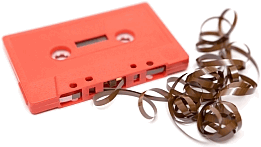
Then the Floppy Disk
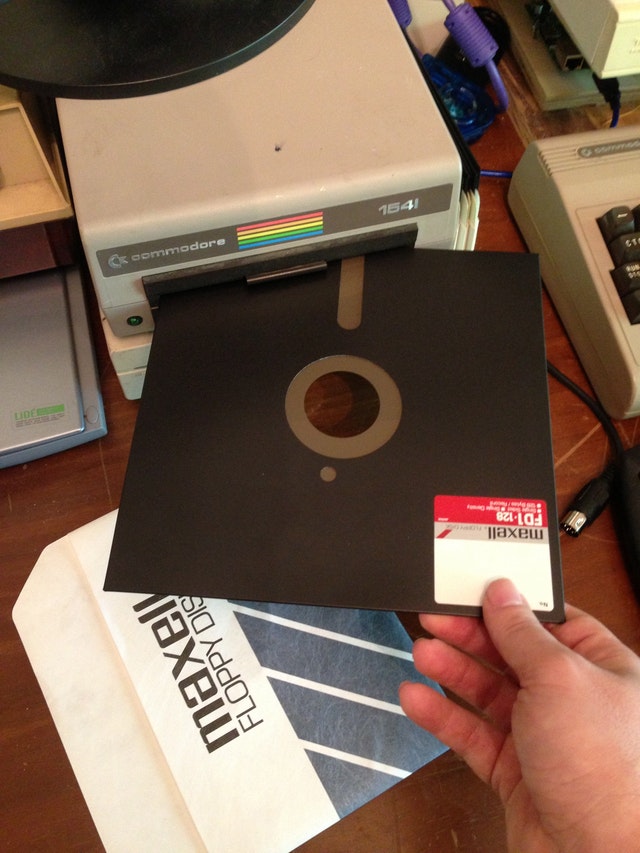
A miracle, only 8" across that could hold an amazing 150,000 characters
(Your phone today can store at least 11,000 times as much.)
"No computer will ever need more than 4K of memory"
~ John Von Neuman
~ John Von Neuman
1903 - 1957, Mathematician
& Father of Modern Computing
& Father of Modern Computing
Wow! Was he wrong! But neither he nor anyone else could have
imagined all the uses to which we now put computers, especially given
that 90% of such uses are utterly trivial, redundant and even silly.
Back then a computer was a resource so scarce, so expensive, and so important to science, math and government that the idea of ever doing anything trivial with one was beyond imagination.
"Trivial" takes a lot more memory.
Back then a computer was a resource so scarce, so expensive, and so important to science, math and government that the idea of ever doing anything trivial with one was beyond imagination.
"Trivial" takes a lot more memory.
Then came "DAT" (Digital Audio Tape, which in spite
of its name, was an awesome data storage medium)
of its name, was an awesome data storage medium)
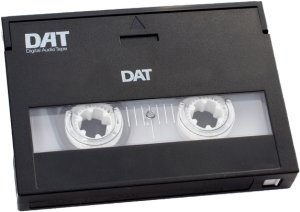
This perfected form of magnetic tape lasted on the consumer market about
2 1/2 days (or so) [but continued in some professional areas] to be replaced by:
Stacks (and Stacks) of little "Computer Cookies"
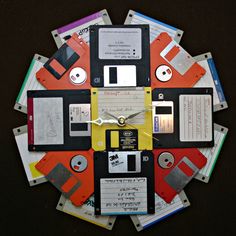
And what do we use any of those
billions of floppy disks for today?
Not much...
billions of floppy disks for today?
Not much...
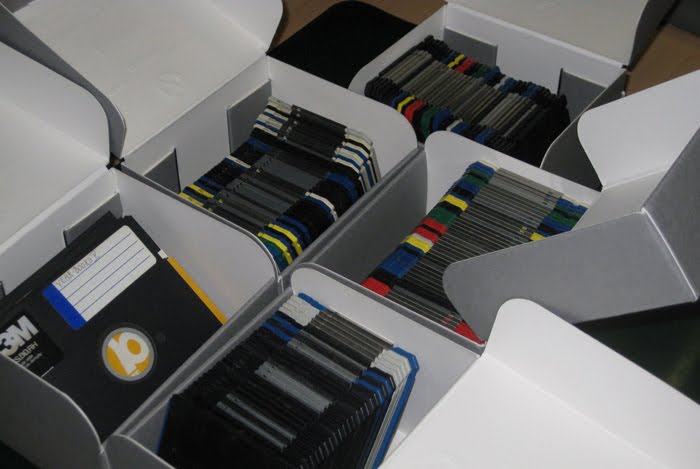
Note: these "Computer Cookies" should not be confused with "cookies" now, which is an
internet term, really. (See box to the right.) These were called Cookies because on Star Trek
Spock's data thingies had no name and among Trekkies were commonly just called
"Spock's Computer Cookies" (see below). So when the 3.5" data disks came out
those of the Trekkie persuasion (which back then was everybody in the computer
industry) called them, naturally, computer cookies. [The internet "cookie" might
also have been named after this, in its own fashion. Geeks are like that.]
Browser Cookies
An internet or "browser" cookie is a tiny bit of data, stored on the user's computer, by a website, that allows things like your preferences, last date you visited this site, or whatever tiny bits of data might make your experience of that site more streamlined and convenient, without your having an account on that site.
(When you have an account, and log in, then there are other, far more invasive ways of tracking such data. The EU doesn't insist on warning people all over the world about that, now do they?)
Such a cookie can (generally) contain no more than 4K of data, and sometimes less. That's less than the smallest graphic on this entire page. It's not enough to steal your identity, track your purchases, break your passwords, or any thing else that cookies are occasionally accused of.
Also: that cookie can contain data accessible again ONLY by that same website, nor can a website access cookies from other sites. It's all pretty secure, really.
Besides: Did you know you can turn off cookies on your browser? Don't want them? Then turn them off! Don't blame the internet for doing what it was designed to do, especially when you already have total control over that feature.
Of course, a lot of websites may stop working if you do that, including some rather important ones. Go figure...
Billions of these were manufactured, sold, used, passed on to the kids, used some more, turned into abstract art, used as drink coasters, stored in the attic or basement, lost, found again, thrown away, collected by the Garbage Man to be read late at night, and so on...
They could store an enormous 1.44 megabytes each... yeah, the pictures you casually take with your phone now are larger (much) than that. Back then? That was the fabled riches of the Golden Kingdom of Dataland.


And actually (as hinted above) those were first invented on Star Trek,
about 1968, most of 20 years before the fact.
about 1968, most of 20 years before the fact.
So, did those little hard floppies happen because of Star Trek?
I mean, we already know Star Trek invented the Cell Phone, right?
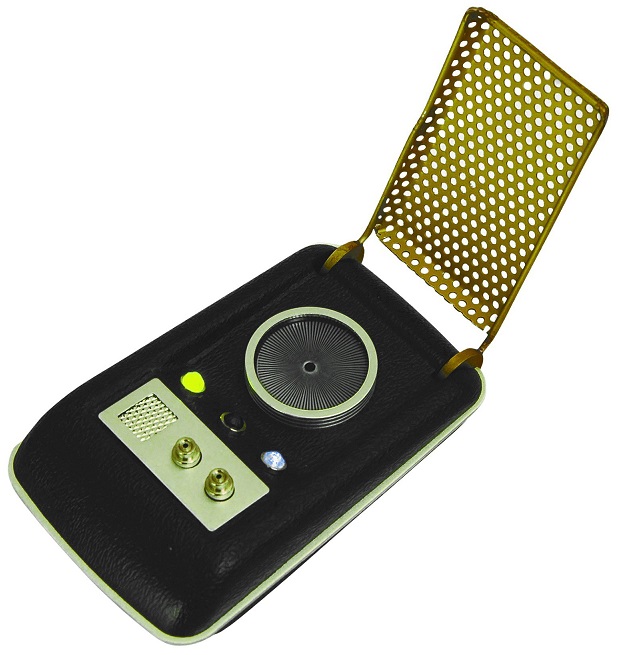
|
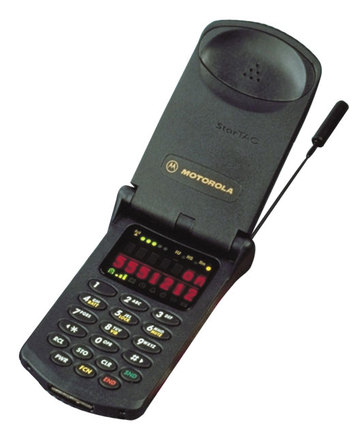
|
| 1967 | 1983 |
(As I said above, really, Robert Heinlein first invented
it in 1948, but Star Trek made it real, you could see it.)
it in 1948, but Star Trek made it real, you could see it.)
Regardless: that's the power of SciFi on the mind of a future engineer
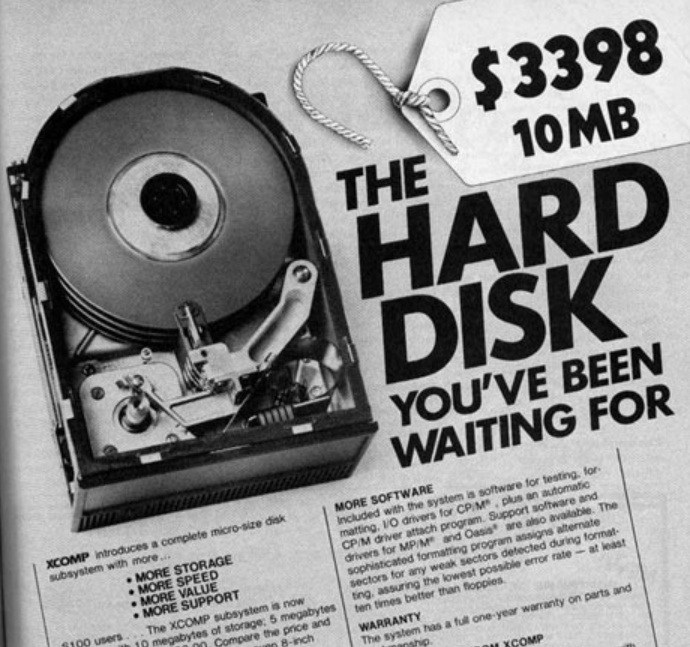 There was also the rise of the Hard Drive during all this electronic frenzy.
The hard drive is rarely given its due for the dazzling manufacturing prowess
that makes it possible. Imagine accurately storing a blip of data on a spot 1,000th
the diameter of a human hair, and being able to find it again whenever you want?!?
There was also the rise of the Hard Drive during all this electronic frenzy.
The hard drive is rarely given its due for the dazzling manufacturing prowess
that makes it possible. Imagine accurately storing a blip of data on a spot 1,000th
the diameter of a human hair, and being able to find it again whenever you want?!?
I can't find my house keys half the time...
Also, as you can see, the cost per megabyte of storage has come down a little in the last few years! ($3,398.00, approx 1984, would be about $9,781 in 2018 money. Which would make it nearly $1,000 per megabyte of storage, in today's money. But now we buy hard drives for about $.00005 per megabyte! (5¢ a gigabyte, that is!) Storage is now 1/20,000,000th the cost that it was in 1984. Personally, my mind rebels at understanding such numbers...
Then the "CD" which Bill Gates declared would be "the New Papyrus" (approx 1990).
These are, in fact, now used about as often as Papyrus scrolls. So, he was right!
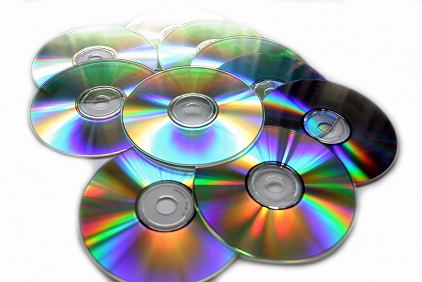
|

|
Did you know that when CDs first came out (approx 1982 -- for music mostly,
took a while longer yet for their use to get over to computers) they were
critized for having too much storage capacity? The average person,
the critics said, would never be able to use all that. It was a waste
of optical quality plastic.
This tells you pretty much all you need to know about critics.
DVDs, with as much as 16x times the capacity of CDs are now nearly obsolete also, except for keeping your favorite reruns on, which, actually, most people now stream directly off the Internet.
This tells you pretty much all you need to know about critics.
DVDs, with as much as 16x times the capacity of CDs are now nearly obsolete also, except for keeping your favorite reruns on, which, actually, most people now stream directly off the Internet.
Anyway, a few more steps along the way...
which we'll just gloss over for the moment
which we'll just gloss over for the moment
Then Came the Cloud...
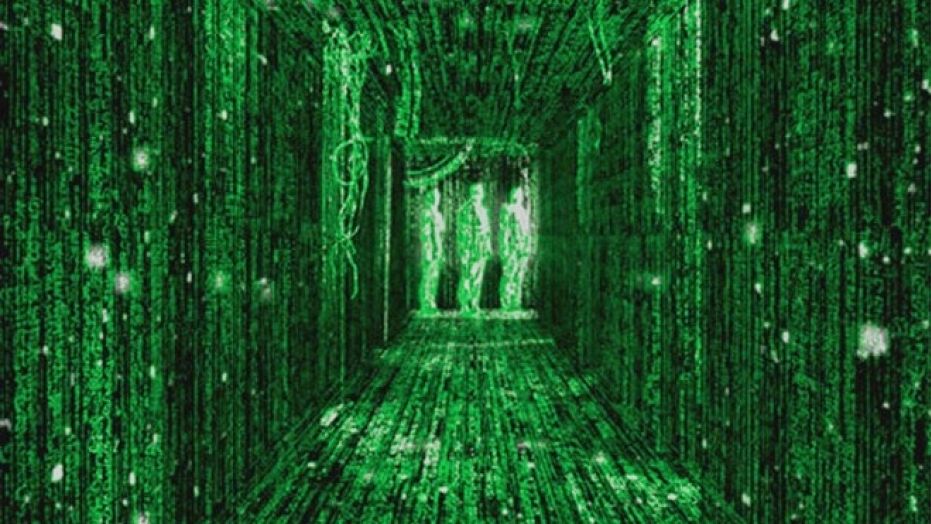
Err, I mean, then Came the Cloud...

(Amazing how similar those two images are (discounting coloration);
the impact of SciFi on "real life" again)
the impact of SciFi on "real life" again)
"The Cloud" -- which is only a marketeer's repackaging of the Internet,
and which leaves us finally without even the illusion of a physical form for our data storage.
All that data now tucked away in some mysterious thing known to most people only by its marketing name, some place we are supposed to feel safe and secure about, even though we don't know where it is, who has access to it, how things are actually stored there, how vulnerable that facility is, physically or otherwise, or much of anything else about it.
If the power grid fails and never comes back, the cave paintings at Lascaux, already 20,000 years old (give or take) will still be there, but the last issue of Sports Illustrated will be gone forever.
(Well, as Douglas Adams said, "Who's that going to inconvenience?")
and which leaves us finally without even the illusion of a physical form for our data storage.
All that data now tucked away in some mysterious thing known to most people only by its marketing name, some place we are supposed to feel safe and secure about, even though we don't know where it is, who has access to it, how things are actually stored there, how vulnerable that facility is, physically or otherwise, or much of anything else about it.
If the power grid fails and never comes back, the cave paintings at Lascaux, already 20,000 years old (give or take) will still be there, but the last issue of Sports Illustrated will be gone forever.
(Well, as Douglas Adams said, "Who's that going to inconvenience?")
Lot's and lots more could be said on this subject. Like, waaaay lots more.
But then we'd have to find more room to store it all, wouldn't we?
But then we'd have to find more room to store it all, wouldn't we?
So what do WE do, here at Around Town Pubs?
 To paraphrase Vin Tanner
To paraphrase Vin Tanner
(played by Steven McQueen in The Magnificent Seven 1960, The Mirisch Company),
 We Deal in Data, Friend.
We Deal in Data, Friend.
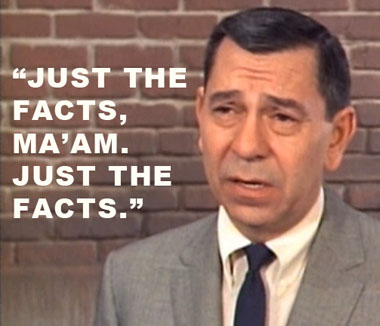 That is, we aim to be like Joe Friday
(of Dragnet, played by Jack Webb, radio 1949 and TV 1951 & 1967)
and present "Just the Facts."
That is, we aim to be like Joe Friday
(of Dragnet, played by Jack Webb, radio 1949 and TV 1951 & 1967)
and present "Just the Facts."
 Just as John McClaine
Just as John McClaine
(played by Bruce Willis, in Die Hard II, 1990),
said, "Just the Fax, ma'am."
Oh... no, nevermind. Unrelated...
 To put it another way, we Print a newspaper, each week. Old fashioned, actual Paper.
To put it another way, we Print a newspaper, each week. Old fashioned, actual Paper.
Printing press, Ink, distributed by an actual person in a Car, fer Gossakes.
(At least it's not on Papyrus, or Hand Illuminated, right?)
It's a thing you can hold in your hand, flip the pages of, and even scribble in. The value of that must not be underestimated. When you can't "touch" the data, it's less real. Even data in a book.
 To paraphrase Vin Tanner
To paraphrase Vin Tanner
(played by Steven McQueen in The Magnificent Seven 1960, The Mirisch Company),
 We Deal in Data, Friend.
We Deal in Data, Friend. That is, we aim to be like Joe Friday
(of Dragnet, played by Jack Webb, radio 1949 and TV 1951 & 1967)
and present "Just the Facts."
That is, we aim to be like Joe Friday
(of Dragnet, played by Jack Webb, radio 1949 and TV 1951 & 1967)
and present "Just the Facts."
 Just as John McClaine
Just as John McClaine(played by Bruce Willis, in Die Hard II, 1990),
said, "Just the Fax, ma'am."
Oh... no, nevermind. Unrelated...
 To put it another way, we Print a newspaper, each week. Old fashioned, actual Paper.
To put it another way, we Print a newspaper, each week. Old fashioned, actual Paper.Printing press, Ink, distributed by an actual person in a Car, fer Gossakes.
(At least it's not on Papyrus, or Hand Illuminated, right?)
It's a thing you can hold in your hand, flip the pages of, and even scribble in. The value of that must not be underestimated. When you can't "touch" the data, it's less real. Even data in a book.
(Maybe some relationship to the rise of "fake news" (so-called) and most "facts" (so-called) now
coming from a medium you can't touch?
As the Wise-Old-Wierdo in Hitchhiker's Guide to the Galaxy said, "Who can say?"
As the Wise-Old-Wierdo in Hitchhiker's Guide to the Galaxy said, "Who can say?"
This useless but hopefully entertaining little synopsis of record keeping over the last 20,000 years (or so) is from the desk of Phil DeGeorge, Computer Whisperer, who apparently had something like 15 hours with absolutely nothing [at all] better to do.
Actually, this article is largely accurate, just not at all complete. People have been keeping records for a very, very long time, in a mind-boggling array of methods and styles, though the concept of "record keeping" took a long time to come to fruition, and even longer to get generalized as "data storage."
☆ Welcome to the 21st Century. We were a long time getting here.
☆ Enjoy the times you live in! They are unique in Human History. (Unless records were lost!)
☆ Enjoy the times you live in! They are unique in Human History. (Unless records were lost!)
Another Hand-Crafted, Olde-World Website, built with Traditional Craftsmanship and Professional Values
Web Design & Webmaster -- Phil DeGeorge, phil.degeorge@gmail.com



